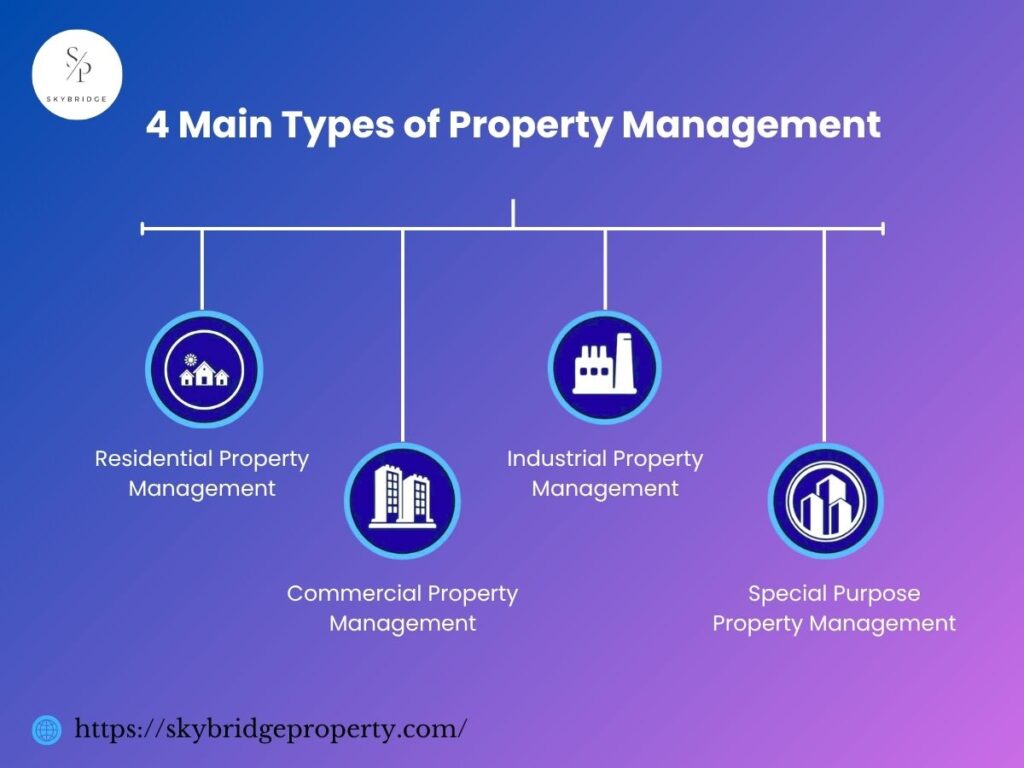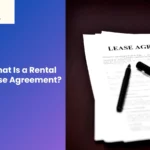Property management plays a crucial role in maintaining and maximizing real estate value. However, not all properties are managed the same way, as each property comes with distinct responsibilities, legal requirements, operational challenges, and tenant expectations. Understanding the differences is crucial to ensure the right management is applied, to ultimately protect their investment and optimize returns.
Each property type requires unique or specific expertise to suit its demands, responsibilities, and legal processes. Factors such as maintenance requirements, lease structure, tenant retention strategies, and property marketing also significantly differ by property type.
Hence, for property owners and investors, understanding the various types of property management is essential to make informed decisions that optimize returns, minimize risks, and enhance asset value.
4 Types of Property Management
The four main types of property management are residential, commercial, industrial, and special purpose property management.
Residential Property Management
Focuses on homes, condos, and apartments — ensuring occupancy, rent flow, and tenant satisfaction for owners.
Commercial Property Management
Oversees office, retail, and hotel spaces — emphasizing profitability, lease optimization, and long-term tenant relations.
Industrial Property Management
Targets warehouses and plants — ensuring compliance, infrastructure safety, and efficient logistics.
Special-Purpose Property Management
Handles schools, hospitals, and religious buildings — managing complex operations, safety, and sector-specific laws.
Residential Property Management
Managing residential properties involves representing property owners in the professional care of single-family homes, multi-family homes, luxury units, apartments, townhouses, and condominiums. The key role of the residential property manager is to serve as the land owner’s representative and ensure that properties are maintained properly, tenants’ needs are met, and the owner’s investment is protected and profitable. This type of property manager oversees smaller properties and buildings, making it different from other types of property management.
Key responsibilities in Residential Property Management include:
- Tenant Placement: Selecting competent tenants for available units through proper tenant screening and background checks.
- Marketing: Advertising vacancies and promoting units through effective marketing to attract tenants and fill units quickly.
- Rent Collection: Collecting rent and security deposits promptly with a pre-informed late fee if required.
- Maintenance: Scheduling and performing regular maintenance to preserve the property’s condition, handling repair requests on time, and managing maintenance vendors and staff.
- Compliance with Housing Laws: Adhering to local, state, and federal housing laws to avoid legal issues and ensuring the unit meets health and safety standards.
- Eviction: Handling eviction processes professionally and legally when tenants fail to meet lease terms or violate policies.
- Accounting: Managing financial records like budgets/ operational costs, handling payment issues, and providing financial reports to owners.
Benefits of Residential Property Management
- Stable Income: Residential property management manages a consistent stream of rental income with lease policies if payments aren’t received.
- Long-Term Investment Potential: Property value often grows over time and provides property owners with benefits in rental as well as capital gains.
- Efficient Tenant Management: Property managers handle tenant screening, lease agreements, move-ins and outs, and tenant disputes, improving tenant quality and reducing the owner’s stress.
- Time and Stress Savings: Owners can focus on other important tasks and benefit from their investment while managers work for them.
Challenges of Residential Property Management:
- Rent Collection: Maintaining consistent rent collection becomes a major challenge during economic downturns, often disrupting cash flow and forcing property managers to initiate costly legal or eviction processes. Implementing automated payment systems and early intervention policies improves rent consistency and reduces the need for legal escalation.
- High Tenant Turnover: Frequent move-outs, long vacancies, and increased operational turnover drive down rental income while inflating maintenance and marketing expenses. Enhancing tenant screening, offering retention incentives, and maintaining property quality stabilizes occupancy rates and controls operational costs.
- Regulatory Compliance: Keeping up with constantly evolving housing laws, fair housing rules, building codes, and landlord-tenant regulations places continual pressure on property managers to avoid penalties and legal disputes. Establishing legal compliance checklists and scheduling regular policy reviews ensures adherence to all housing, safety, and tenant-related regulations.
Residential Tenant Lifecycle Journey
Tenant Screening
Evaluate applicants based on credit score, rental history, employment, and background checks.
Lease Agreement
Draft and sign legal contracts outlining rent, duration, rules, and security deposits.
Move-In & Deposit
Complete inspections, collect deposits, and provide access along with welcome information.
Maintenance & Support
Coordinate repairs, routine upkeep, and emergency support throughout tenancy.
Rent Collection
Manage on-time payments via manual or online systems and enforce late penalties if needed.
Renewal or Exit
Offer renewal options, adjust lease terms, or manage move-outs with final inspection and returns.
Commercial Property Management
Handling the operation, maintenance, and oversight of commercial properties like office buildings, retail spaces, hotels, malls, and industrial complexes falls under the scope of commercial property management. This type of property management focuses on maximizing profitability by maintaining and improving the value of commercial real estate assets. The key roles of commercial property management are screening tenants, negotiating lease agreements, maintenance, and upkeep of the properties.
Key responsibilities in Commercial Property Management include:
- Lease Negotiations: Drafting and negotiating lease agreements and renewals with tenants, particularly long-term leases with corporate tenants. They maintain accurate leases and documentation, track lease expirations and rent escalations on the owner’s behalf.
- Property Marketing: They market available spaces and screen tenants, maintain a positive image of the property, keeping it well-maintained and inviting to attract long-term tenants.
- Tenant Relations: Building strong relationships with tenants to ensure long-term retention by addressing tenant inquiries, complaints, facilitating renewals, and ensuring a smooth operation.
- Handling Common Area Maintenance (CAM) Charges: Preparing a budget for CAM, such as parking lots, lobbies, and hallways, ensuring they are well-maintained and meet safety and aesthetic standards. They ensure that CAM charges comply with local laws, codes, and environmental regulations.
Benefits of Commercial Property Management
- Higher Rental Income Potential: Commercial properties support and retain high-quality tenants and often generate higher rents than residential properties, especially in prime locations.
- Long-Term Tenants: Quick response and effective communication provide greater stability and reduce the turnover rate.
- Property Appreciation: Well-managed commercial properties with reduced operating costs have a higher potential for increased property value. Tenant satisfaction likely encourages them to renew leases, which sustains long-term value.
Challenges of Commercial Property Management
- Managing tenant conflicts: Balancing tenant needs and maintaining a positive environment in commercial spaces like office towers and malls challenges managers to resolve disputes quickly and preserve tenant retention. Implementing clear communication protocols, tenant handbooks, and swift conflict resolution policies strengthens relationships and enhances tenant satisfaction.
- Staying ahead of market trends: Responding to shifts in tenant demands, retail patterns, and workspace expectations requires managers to continuously adapt leasing strategies and maximize property profitability. Conducting regular market analyses and updating leasing models based on emerging trends keeps properties competitive and aligned with tenant needs.
- Managing Information: Coordinating lease agreements, zoning compliance, and building maintenance records across multiple tenants demands accurate information management to avoid legal risks and operational inefficiencies. Deploying centralized property management software ensures real-time tracking of leases, compliance deadlines, and facility maintenance activities.
How Well Do You Know Commercial Property Management?
Q1. What is a key difference between commercial and residential leases?
Q2. What responsibility does a commercial property manager handle?
Q3. Why is compliance more complex for commercial properties?
Industrial Property Management
Specializing in the management of industrial spaces, industrial property management targets facilities such as warehouses, manufacturing plants, and distribution centers. This type of property management emphasizes addressing the specific needs and challenges of industrial sites to uphold safety standards and compliance with safety and health regulations. It focuses on ensuring that large spaces are efficiently utilized and maintained to meet the specific needs of industrial operations. Industrial properties tend to serve high-demand sectors, such as manufacturing, logistics, and storage, where functional efficiency is prioritized over aesthetics.
Key responsibilities in Industrial Property Management include:
- Managing Large Spaces: Strategically plan and allocate interior layouts for storage, equipment, workflow, and organize internal and external vehicle movement to prevent congestion. Oversees expansive properties and optimizes their use for tenants, ensuring that floor plans and layouts meet operational needs.
- Compliance with Zoning Laws: Property managers ensure that industrial properties adhere to all relevant codes, regulations, and standards. By staying compliant with changing regulations and implementing strong protocols, managers reduce legal liabilities and safeguard the well-being of all stakeholders.
- Maintenance of Specialized Equipment: Managing routine upkeep of heavy machinery, loading docks, and other equipment necessary for industrial operations to remain operational and compliant with safety regulations. By addressing maintenance needs on time, managers mitigate risks and provide a secure working environment.
Benefits of Industrial Property Management
- Steady Demand: Quality service improves the reputation of rental units in the market and helps maintain a steady tenant flow. There is often consistent demand for industrial properties, especially in areas with strong logistics networks or proximity to transport hubs.
- Long-Term Leases: Industrial leases often span 5 to 20 years, providing stability and minimizing tenant turnover. In addition, swift negotiations help maintain stable and long-term tenancies.
- Efficient Space Utilization: Optimized layouts by helping tenants maximize warehouse space, logistic flow, and production lines. Also ensures the property remains attractive and flexible for different industrial tenants in the future.
Challenges of Industrial Property Management
- Regulatory Compliance: Maintaining strict compliance with OSHA standards, fire codes, and hazard prevention protocols challenges industrial facilities like manufacturing plants and freight terminals. Failure to continuously update safety systems exposes operations to legal risks and costly disruptions. Establishing proactive compliance programs, regular audits, and rapid response protocols ensures facilities stay aligned with evolving safety regulations.
- Technology and Security: Keeping pace with evolving automation, surveillance, and cybersecurity technologies challenges industrial properties that must secure high-value assets and streamline operations. Limited investment in smart infrastructure increases vulnerabilities and reduces operational resilience. Deploying integrated smart technologies, upgrading security systems, and investing in cybersecurity frameworks strengthens asset protection and operational efficiency.
Industrial Facility Readiness Checklist
Use this interactive checklist to assess whether your industrial property meets key operational standards.
Special Purpose Property Management
Operating and maintaining niche-specific properties defines the role of special purpose property management, which covers healthcare facilities, recreational centers, educational institutions, and religious buildings. These properties require specialized knowledge and operational strategies due to their unique requirements and regulations linked with them. They often serve niche markets.
Key responsibilities in Special Purpose Property Management include:
- Unique Operational Requirements: Each type of property has specific needs based on its function and distinct operational needs. For example, coordinating educational activities in school and managing patient care in hospitals.
- Compliance with Specific Regulations: Special purpose properties must adhere to industry-specific laws and standards and stay up-to-date with local, state, and federal laws related to health, safety, fire codes, and industry-specific certifications like HIPAA, NEC, and ADA.
- Coordinating Specialized Maintenance: Developing tailored maintenance and ensuring that the property’s specialized infrastructure (e.g., medical equipment, educational facilities) is operational and properly maintained to prevent system downtime.
Benefits of Special Purpose Property Management
- Less Competition: These properties often serve niche markets, which reduces competition, allowing property owners or managers to set higher rental rates.
- Unique Niche Market Requirements: Property managers acknowledge the operational, structural, and regulatory needs of the specific use. For example, acoustics in theaters and medical equipment standards in hospitals.
Challenges of Special Purpose Property Management
- Specialized Maintenance: Managing specialized maintenance demands deep operational knowledge, such as maintaining medical waste systems or backup power in hospitals and upkeeping critical systems in venues and airports. Deploying domain-trained maintenance teams and system-specific service protocols ensures the continuous operation of critical infrastructure.
- Navigating Complex Regulations: Managing special-purpose properties demands compliance with strict sector-specific laws, zoning restrictions, and operational codes, particularly when converting assets like hospitals, schools, or churches into new uses. Implementing regulatory compliance frameworks and consulting sector-specific legal experts ensures operational strategies meet legal, zoning, and safety requirements.
Special-Purpose Property Readiness
Select a property type to view its key operational requirements.
What Are the Key Benefits of Property Management?
Property management offers a range of key benefits like protecting real estate assets, reducing vacancy periods, ensuring legal compliance, and enhancing tenant satisfaction. They handle operations like tenant screening, lease enforcement, and rent collection, offering owners time efficiency and allowing them to focus on growing their investment in other sectors.
Management professionals provide financial reporting and budgeting, risk mitigation, handle disputes or evictions, and keep the property legally compliant for commercial, mixed-use, or multi-family properties. These services improve cost control, rental income outcomes, and asset longevity while helping rental properties to function independently. Understanding the benefits of property management is essential for property owners seeking long-term efficiency and profitability.
What Are the Key Benefits of Property Management?
Tenant Satisfaction
Quick response, clear communication, and reliable service lead to happier, longer-staying tenants.
Why Are Professional Property Management Services Important for Different Property Types?
Partnering with an experienced property management company helps diverse properties operate efficiently, maximize returns, and improve tenant satisfaction. Professional services streamline daily operations, apply tailored leasing strategies, and bring essential industry expertise to property owners.
Find the Right Property Management Strategy
Select your property type to understand why professional services matter—and what Skybridge recommends.
Skybridge Property Group embodies this standard by providing specialized management solutions tailored to the unique needs of properties in Los Angeles, Diamond Bar, Pomona, La Puente, and San Dimas. With a focus on customized service delivery, strong tenant relationships, and proven industry expertise, Skybridge Property Group enables property owners to achieve operational efficiency and maximize asset performance.







